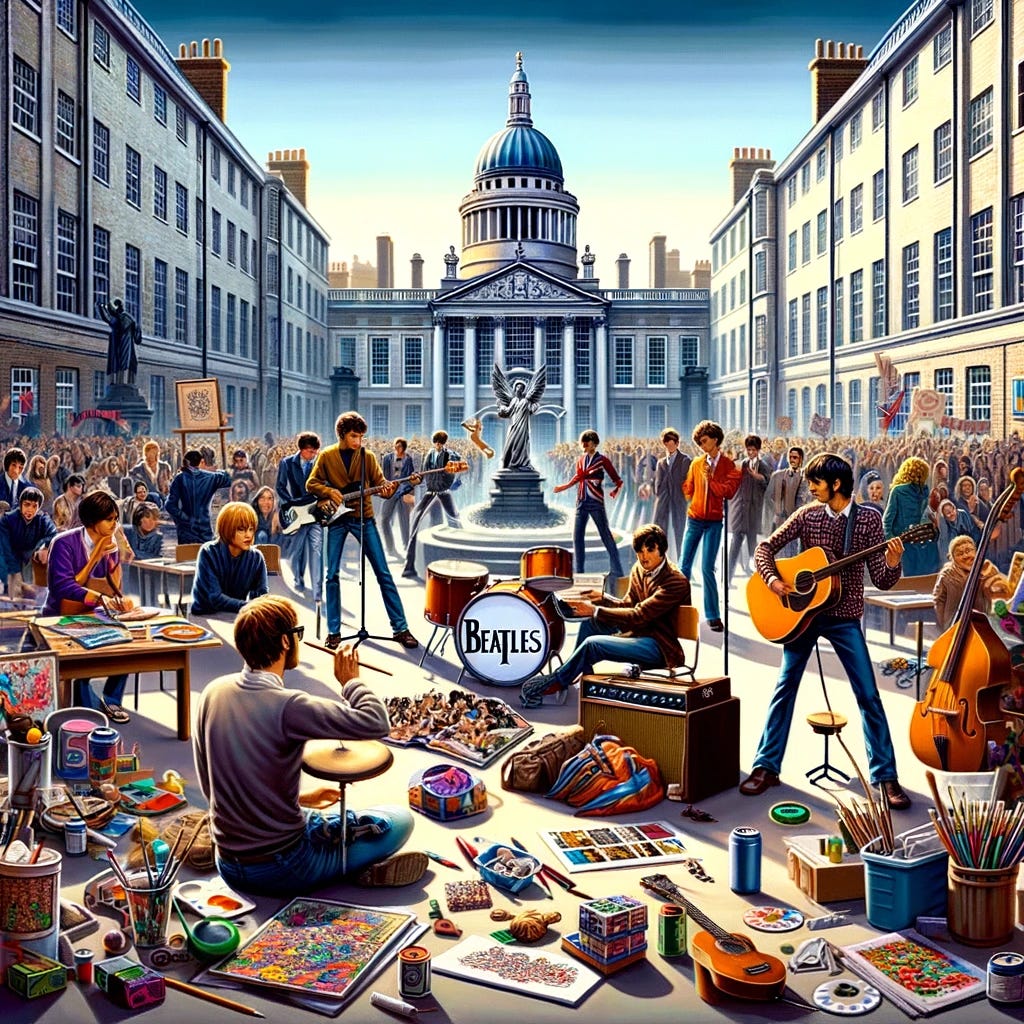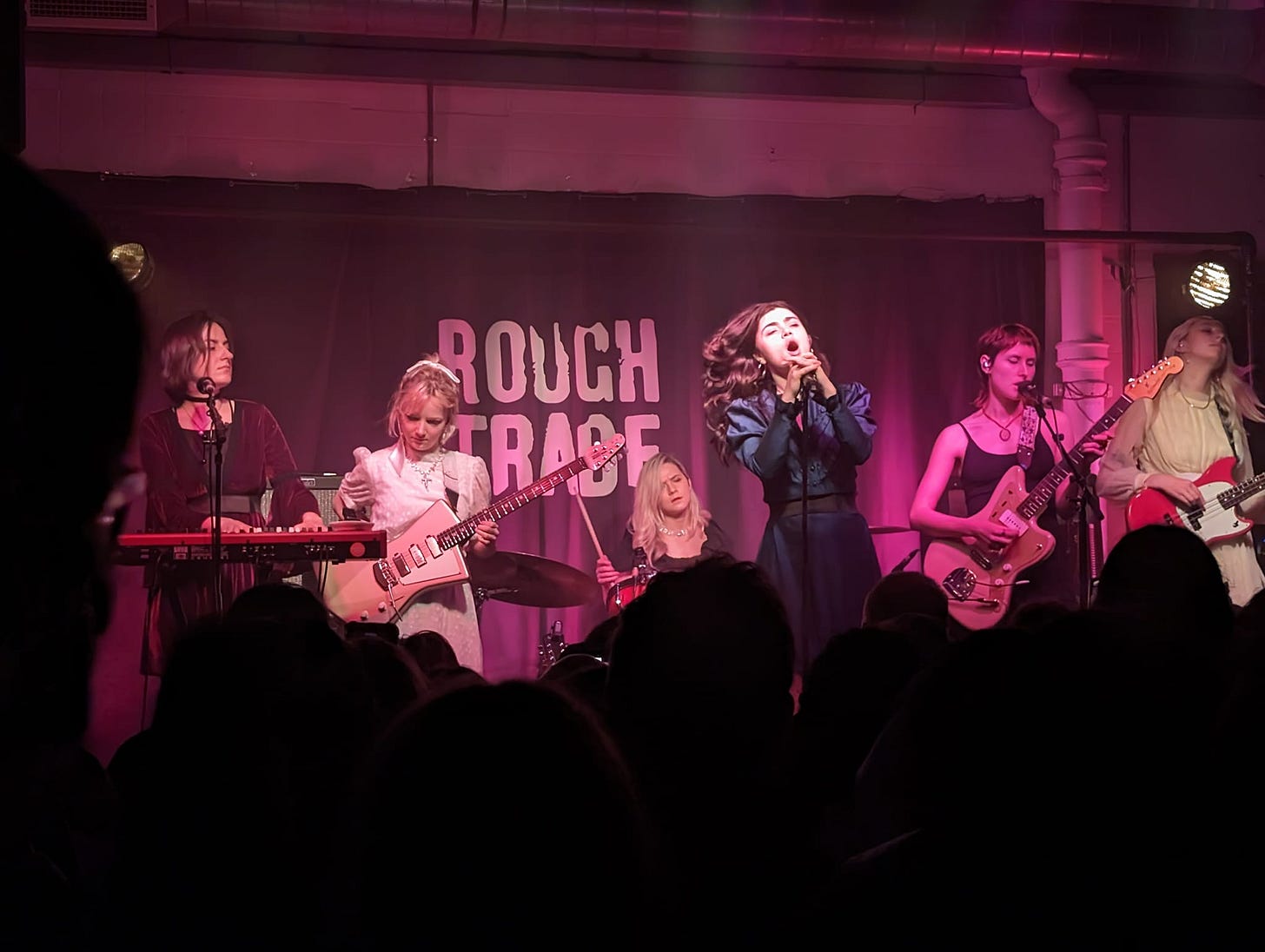Hype is a nebulous concept that means different things to different people. Gay Dad, Menswe@r and Terris received it, as have Arcade Fire, Arctic Monkeys, The Beatles and The Kings of Leon. For a lot of 2023 and 2024 to date, The Last Dinner Party have been embroiled in an imbroglio on whether or not they are industry plants.
Firstly, I’m not sure what the phrase industry plant means. I assume it is to say that grassroots support for an artist is not what it seems, and there are some shady goings on transpiring behind the scenes. I suspect that is the case to some degree with most acts. Someone somewhere is nudging or shoving them into the spotlight; that’s what marketing, PR and social media are all about. Did someone’s cousin retweet something, and we didn’t know about that link? Oh no!
When it is so easy for music to be heard and shared, I doubt many word-of-mouth-only acts will get a look in with the industry dominated by successive generations of artists who usually would have stepped back or stepped off the stage by now.
In that respect, any artist who gets support from the industry early in their career, for whatever reason, would attract that tag, so why have The Last Dinner Party received brickbats for significant label attention before their first single? Is it the Sound of 2024 nod or the BRIT award? I suspect a chunk of it is because they are women and have a posh background.
There was an element of this a couple of years ago with Wet Leg, with people expecting some grand reveal that they are relatives of existing very famous musicians, and that explains everything.
I don't even know what I'm saying
After covering over 50 albums so far, half of which were released before I was born, why am I now writing about a contemporary album? Firstly it is the number one album in the UK; I will not often get the chance to write about a song I’m pretty familiar with while closing a chart-topping album. Secondly, I think it builds on the previous
I don’t think anything is wrong with suspicion of acts that seemingly come out of nowhere and explode over the airways of BBC 6Music’s daytime playlist. More often than not, it is because people like their songs and not because of some astroturfing campaign. But let’s look at the argument.
The band were selling out concerts when they released one single and didn’t even have enough music to last as long as an episode of Bluey. Still, they had generated plenty of column inches full of discourse questioning their organic rise versus industry-backed ascent. Critics label them "industry plants" due to their affiliation with major label Island Records, heavyweight management by QPrime and appearing on the bill1 at Hyde Park in 2022 on a night The Rolling Stones headlined, igniting debates on privilege and access in the music industry.
This scrutiny, particularly intense for female artists, reflects a broader issue of women in music facing disproportionate scepticism about their authenticity and self-driven success, overshadowing their talent and efforts. The band's rebuttal highlights a genuine bond and grassroots beginnings, challenges the industry plant narrative and underscores the sexist undertones in questioning female artists' legitimacy and creative control.
The other concern often mentioned is the number of artists who have broken into the mainstream or seemingly emerged fully formed from families who can pay fees for their children to attend certain schools. If this is an issue in music, it is an issue in many other aspects of life in the UK, where the 7% of students who didn’t go to state schools get a lot more representation than the 93% who didn’t. This extends from British Prime Ministers, England’s men’s cricket team, finance, the legal profession, the top of the military and journalism. You can make up your minds on which of these provides the most concern - regardless, this is now the way that British society operates.
Historically, musicians and bands like Blur, The Beatles, and Oasis benefitted from a societal framework that provided the time and financial support necessary for creative exploration, often through art college opportunities and social welfare benefits like “the dole”. This environment allowed artists to develop their craft with a degree of economic security, even if that was minimal.
However, changes in government policies and cuts to social welfare benefits over the years have eroded this safety net, disproportionately affecting those without financial backing or a supportive network. The reduction in state support means that aspiring musicians now face higher barriers to entry, making it increasingly difficult for individuals from less privileged backgrounds to pursue a career in music.
This shift has narrowed the diversity of voices and experiences within the music industry, as the ability to take creative risks without immediate financial return becomes a luxury that only individuals with certain socioeconomic advantages can afford. This is not the fault of those individuals; they are not using sharp elbows to push past working-class voices, and those voices are not getting the ability to speak at all. Turning down the volume elsewhere will not allow us to hear and understand silence any better.
Back to TLDP. Here’s the thing: the reason their success has been so dramatic is that they speak to large portions of their audience - if the shows I’ve seen footage of and the show I went to at Rough Trade East last night are anything to go on, that’s young women their age and slightly younger. The second is that Abigail Morris oozes confidence and charisma on stage; she’s spent her life dreaming of being a star, years of thinking she is one, and now she will become one over the next few months.
Finally, another reason is that ‘Nothing Matters’ is fantastic. A festival-ready anthem for the fields of this summer and many beyond. It is one of those songs that you play half a dozen times on the day you discover it. It gave me the same feelings I got from ‘Chaise Longue’, ‘Track X’, ‘Avant Gardener‘, ‘Archie, Marry Me’, ‘212’, ‘Video Games’, ‘Mr. Peterson’ ‘Crystalised’, ‘Kiss With A Fist’, ‘Mansard Roof‘, ‘My Manic and I‘, ‘A Certain Romance’ on the Arctic Monkeys’ Beneath The Boardwalk demos, ‘She’s Hearing Voices’, ‘Take Me Out’, ‘Remember Me‘, ‘Losing My Edge’, ‘What A Waster’, ‘House of Jealous Lovers’ and ‘The Modern Age’. Ultimately, chasing that hit is why we are all seeking new music.
The Last Dinner Party’s debut album, Prelude to Ecstasy, does not reference the 1973 Steely Dan album Countdown To Ecstasy2. Still, to my ears, some of guitarist Emily Roberts’s licks are very much Dan-adjacent, bringing to mind Sparks, Queen, Roxy Music and even Gang of Four as well. There’s a whiff of Suede about them too. It is one of those debuts where we are familiar with half of the songs before the album comes out. The band should be credited for neither re-recording vibrant early work from inside a bin (Hello to The Smiths and The Strokes) nor front-loading the record by placing three of their singles in the back third of the tracklisting and setting up the final track ‘Mirror’ with ‘Nothing Matters’ as the penultimate song.
The closing track’s introspective lyrics, particularly the refrain "I'm just a mirror, I don't exist without your gaze," make you consider themes of identity, perception, and the existential quandary of self (in relation to the other), offering a poignant commentary on the human condition. While in lesser hands, this can border on cliché; this metaphor is reinvigorated by the song's rich, dynamic composition, which Producer James Ford (Arctic Monkeys, Foals, Blur and others) has given a shine that could easily find its place on a film score with its slow-burning drums and dramatic instrumental crescendos.
The track showcases The Last Dinner Party's fearless, take-no-prisoners approach to the record. Daring to seamlessly weave classical influences, no doubt through the talents of Roberts and Aurora Nishevci, into modern indie, creating a hybrid that recalls previous torchbearers but sounds fresh and dynamic - to the extent you wonder why hasn’t anyone tried this before. The Lana Del Rey and Siouxsie Sioux comparisons bear the most fruit on the concluding track, from the song’s sultry intro to the reflections3 on the male gaze and the final instrumental flourishes.
For anyone not on board, I’m sorry that you aren’t able to take the pleasure I can from this band having a great time. I fear 2024 will last slightly longer than most years for you.4
I don’t think this counts as supporting the Rolling Stones in how we usually associate that term.
I know this as I asked Abigail last night after the gig.
I can write jokes; they just don't interest me.
Please take a look at the previous note.








There's a reason "industry plant" discourse exists; but sexism ain't that reason.
The way opportunities are given in the music business seems more opaque and inscrutable than ever before; + when people who have worked + fought for those opportunities for decades are not given even a glance while others are just served them like winning lottery tickets without any signs of having struggled, that gets many people wondering where + how those 'tickets' were bought.
Those 'tickets' do go to women more often, but that's only correlative, not causative; fact is, women get better treatment on every level of music these days. Better professional management is one key to that; also, there are more women in powerful non-performer positions now (like venue owners, bookers, writers, and label execs) than ever.
But even other women working in music often resent the easy 'visibility' granted to a favored few, while so many others of every gender are kept "invisible".
Contrary to conventional opinion, it IS a zero-sum game; it has been since the late-1990s. The allowable cultural "bandwidth" for new music has shrunk; thanks to the massive amount of nostalgia-based content eating the available airtime and print-space. So who gets what's left and how is gonna be a lot more scrutinized, more contested subject.
To dismiss that scrutiny and controversy by merely ascribing it to bigotry (sexism, racism, etc.) to defend one's favorites won't make it go away. Folks already know this business ain't a "meritocracy", + never has been. And when they get passed over for the 1,055th time, in favor of someone sprung fully grown from the head of Zeus, they're gonna talk sharp about it.
So, we saw LDP in a smallish (yet not rammed) tent at last year's Y Not festival, and they were innovative, fun, exciting and, more importantly, very good.
Some of the 'anti' media reaction that you reference definitely prompted a question of, "am I right to like this?", and I think you're correct this is heightened by their obvious 'poshness' (as clearly only those from the slums can make good music and, even then, only after 'paying their dues'!)
In the end, I simply decided this was b****ks; LDP are just a brilliant new band, with great songs, who put on a fantastic show. What else matters?